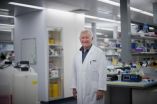(Press-News.org) University of Adelaide computer scientists are leading a project to develop novel sensor systems to help older people keep living independently and safely in their own homes.
The researchers are adapting radio-frequency identification (RFID) and sensor technologies to automatically identify and monitor human activity; to be able to determine if an individual's normal routine is being maintained so that timely assistance can be provided if it is needed.
Although RFID technology has been around since World War 2 and is in common use today in applications such as anti-shoplifting and vehicle identification at toll road collection points, its potential use in interpreting human activity remains largely in the laboratory.
"Our work will be among the first few projects in the world conducting large-scale common-sense reasoning in automatic human activity recognition," says Chief Investigator and University of Adelaide Senior Lecturer Dr Michael Sheng.
Dr Sheng says the technology and system they propose has huge potential value in an aging population.
"This is becoming a significant problem for most developed countries where the proportion of older people is rapidly increasing and the labour market is tightening – there are more elderly people to be looked after but less people to do it," Dr Sheng says.
"We are trying to solve this by developing a system using a network of sensors attached to objects that the person is interacting with in the home; using software to interpret the collected data to tell us what someone is doing."
The system will be low-cost and unobtrusive and without the privacy issues and intensive monitoring of video surveillance. There will be no need for older people to wear anything or turn anything on or off.
The research is being funded under the Australian Research Council's Discovery Project scheme over three years, in a collaboration with the University of Queensland and the University of Washington.
The researchers will construct an RFID sensor network for human activity recognition; develop an algorithm to allow the interpretation of collected data into recognised activities; and develop context-aware, commonsense-based automatic reasoning so that changes in activity patterns make sense and can produce an alert for timely intervention.
The technology will be first investigated in a laboratory setting and then in hospital trials with geriatric patients.
### END
Computer science helping the aged stay home
2012-11-14
ELSE PRESS RELEASES FROM THIS DATE:
Preserve the services of mangroves -- Earth's invaluable coastal forests, experts urge
2012-11-14
Experts are urging policy makers to preserve mangroves and their essential services to nature and humanity alike, saying their replacement with shrimp farms and other forms of development is a bad economic tradeoff both short and long-term.
An unprecedented partnership of organizations – from forestry and conservation sectors and from across the United Nations – have released a policy brief drawing on the 2nd edition of the World Atlas of Mangroves (2010). It aims to provide managers with lessons learned in past mangrove conservation and management efforts, and with policy ...
The leggiest animal on Earth lives in the outskirts of Silicon Valley
2012-11-14
The leggiest animal in the world, the millipede lllacme plenipes, was re-discovered several years ago in California by Paul Marek. Now, Marek and his colleagues provide further details of the surprisingly complex anatomy of this diminutive creature and its extreme rarity, limited to a handful of spots just south of San Francisco. More details about the species and its biology can be read in an article that was recently published in the open access journal ZooKeys.
Millipedes have the most legs of any animal group. From their ancestors with just one pair of legs per body ...
Lost in space: Rogue planet spotted?
2012-11-14
Astronomers using ESO's Very Large Telescope and the Canada-France-Hawaii Telescope have identified a body that is very probably a planet wandering through space without a parent star. This is the most exciting free-floating planet candidate so far and the closest such object to the Solar System at a distance of about 100 light-years. Its comparative proximity, and the absence of a bright star very close to it, has allowed the team to study its atmosphere in great detail. This object also gives astronomers a preview of the exoplanets that future instruments aim to image ...
Astronomers find 'homeless' planet wandering through space
2012-11-14
A planet that is not orbiting a star, effectively making it homeless, has been discovered by a team of University of Montreal (UdeM) researchers working with European colleagues and data provided by the Canada-France-Hawaii Telescope (CFHT) and the European Southern Observatory's Very Large Telescope (VLT). "Although theorists had established the existence of this type of very cold and young planet, one had never been observed until today," said Étienne Artigau, an astrophysicist at UdeM. The absence of a shining star in the vicinity of this planet enabled the team to study ...
Georgia Tech releases cyber threats forecast for 2013
2012-11-14
The year ahead will feature new and increasingly sophisticated means to capture and exploit user data, escalating battles over the control of online information and continuous threats to the U.S. supply chain from global sources. Those were the findings made by the Georgia Tech Information Security Center (GTISC) and the Georgia Tech Research Institute (GTRI) in today's release of the Georgia Tech Emerging Cyber Threats Report for 2013. The report was released at the annual Georgia Tech Cyber Security Summit, a gathering of industry and academic leaders who have distinguished ...
Pancreas stem cell discovery may lead to new diabetes treatments
2012-11-14
Stem cells in the adult pancreas have been identified that can be turned into insulin producing cells, a finding that means people with type 1 diabetes might one day be able to regenerate their own insulin-producing cells.
The discovery was made by scientists from the Walter and Eliza Hall Institute and provides further evidence that stem cells don't only occur in the embryo.
The ability to produce the hormone insulin is crucial for controlling blood sugar (glucose) levels. In people with type 1 diabetes the body's immune system destroys the insulin-producing beta cells ...
Antibody-coated stents: Indication of disadvantages
2012-11-14
If narrowed or blocked coronary vessels have to be widened or opened, a vascular support (stent) is usually inserted. Drug-coated stents are preferred for patients at high risk of renewed narrowing of vessels (restenosis). However, the use of antibody-coated stents has been increasing in recent years. Current studies provide indications that these new antibody-coated stents more frequently lead to myocardial infarction and make re-operation necessary. This is the conclusion reached in the rapid report of the German Institute for Quality and Efficiency in Health Care (IQWiG), ...
'Missing link' discovered in the defence mechanism of the tuberculosis pathogen
2012-11-14
Brussels, 14 November 2012 – Flemish biologists lead by Joris Messens (VIB / Vrije Universiteit Brussel) have discovered that Mycobacterium tuberculosis – the bacterium that causes tuberculosis – has an ingenious defence mechanism against oxygen. This knowledge is important in the search for a treatment for tuberculosis. 9.4 million people are infected with tuberculosis annually and 1.7 million people die as a result.
Joris Messens: "We have discovered how Mycobacterium survives the oxygen stress in our body, namely with the aid of the protein mycoredoxin-1. This opens ...
Triclosan in cosmetics and personal care products can increase allergy risk
2012-11-14
Triclosan - an antibacterial chemical found in toothpaste and other products - can contribute to an increased risk of allergy development in children. This comes from the Norwegian Environment and Childhood Asthma Study, in which the Norwegian Institute of Public Health is involved. Similar results are reported in the USA.
Triclosan has been in use for decades, but was recently associated with allergies in children in an American study, the National Health and Nutrition Examination Survey (NHANES). The new Norwegian study found similar associations between allergies ...
New brain gene gives us edge over apes, study suggests
2012-11-14
Scientists have taken a step forward in helping to solve one of life's greatest mysteries – what makes us human?
An international team of researchers have discovered a new gene that helps explain how humans evolved evolved from apes.
Scientists say the gene – called miR-941 – appears to have played a crucial role in human brain development and may shed light on how we learned to use tools and language.
Researchers say it is the first time that a new gene – carried only by humans and not by apes – has been shown to have a specific function within the human body.
A ...




